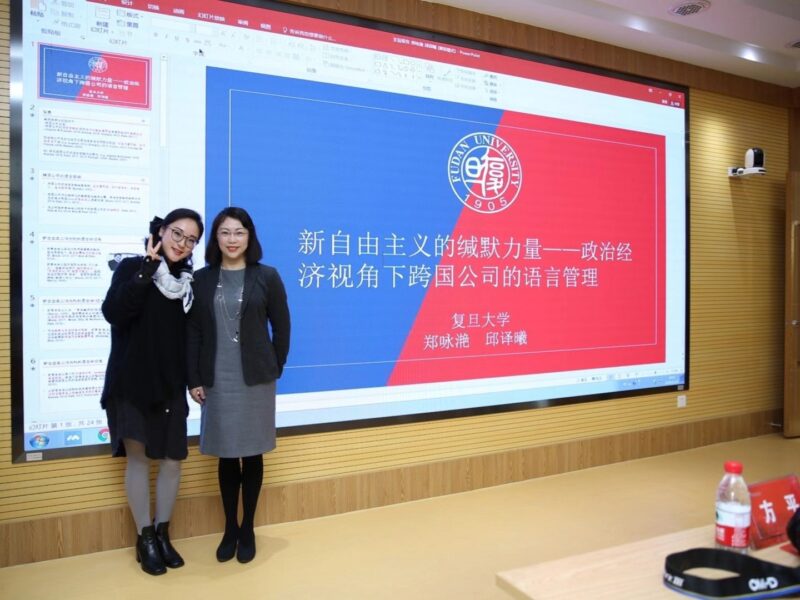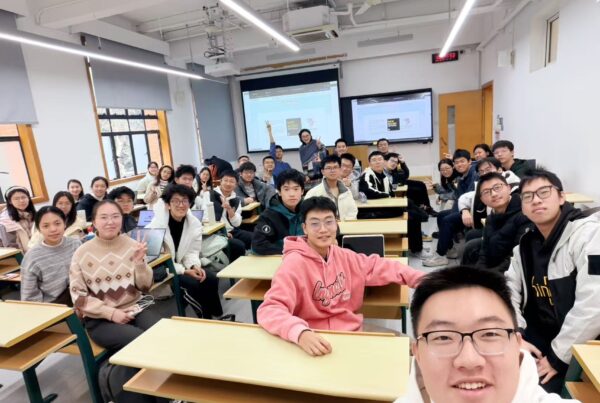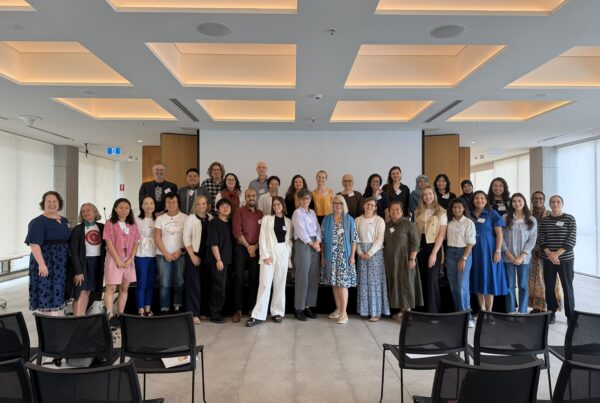In this latest episode of the Language on the Move Podcast, Yixi (Isabella) Qiu speaks with Professor Yongyan Zheng about the Shanghai Multilingualism Alliance.
The interview explores the Alliance’s origins, research themes, and future directions. The episode not only highlights the significant contributions of this dynamic research group but also provides a glimpse into the personal and professional journeys that have shaped this academic endeavor.
Enjoy the show!
This is early days for the Language on the Move Podcast, so please support us by subscribing to our channel on your podcast app of choice, leaving a 5-star review, and recommending the Language on the Move Podcast and our partner the New Books Network to your students, colleagues, and friends.
Further reading
Li, C., Shen, Q., Zhao, K., & Zheng, Y. (2022). The Shanghai alliance of multilingual researchers: Fudan University, Tongji University, Shanghai University of Finance and Economics, and Shanghai International Studies University, China. Language Teaching, 55(4), 583-587. https://doi.org/10.1017/S0261444821000379
Transcript

Yixi (Isabella) and Yongyan present about language management in global corporations
Welcome to the Language on the Move podcast, a channel on the New Books Network. My name is Yixi Qiu. You can call me Isabella.
I’m a PhD candidate in Applied Linguistics in Fudan University, Shanghai, China. I’m also a member of the Language on the Move team. My guest today is Professor Yongyan Zheng, a full professor at the College of Foreign Languages and Literature, Fudan University, Shanghai, China, where she teaches English academic writing and applied linguistics.
Her research interests include second language development, bilingual and multilingual education, and academic literacy practices. She is the editor-in-chief of Language, Culture, and Curriculum, and also the co-editor-in-chief of System. She is a leading scholar in the Shanghai Alliance of Multilingual Researchers. In today’s interview, we will focus on this Shanghai Alliance of Multilingual Researchers, talking about the motivations behind the Alliance, its key research themes, and some of the methodological innovations that the Alliance has pioneered. Welcome to the show, Professor Zheng.
Zheng: Thank you, Isabella, for having me today.
Bella: Could you please start us off by telling us a little bit about this Shanghai Alliance, its members, and its main focus?
Zheng: Yes. We are a group of scholars from four leading universities in Shanghai, especially the northeast part of Shanghai, including Fudan University, Tongji University, Shanghai University of Finance and Economics, and Shanghai International Studies University. We’ve been working together for over 15 years already, and our focus is on the role of multilingualism in China’s unique cultural and educational landscape. Now, our team includes about 10 core researchers, and we are also currently guiding around 30 master’s students, doctoral and postdoctoral researchers. Our work covers three main areas, multilingualism in language education, its influence in Chinese society, and the research methods we use to explore these topics.
Bella: Well, thank you very much for the introduction, Professor Zheng. Now, I’m quite curious about the origins of this Shanghai Alliance. What motivated you and other members to establish this group?
Zheng: The idea for the Alliance actually started from personal connections and shared interests among leading scholars. We are, me, of course, and then Professor Qi Shen from Tongji University, Professor Ziting Li from Shanghai International Studies University, and Professor Ke Zhao at Shanghai University of Finance and Economics. We actually are friends in our life, and Professor Li and Professor Zhao and I, we went to the same PhD program, and so our friendship goes way back. But then we work together, and especially our universities are quite close to each other, so we believe in knowledge construction, we share common interests in exploring multilingualism.
Then we say, why don’t we just start our own alliance? Well, there is a little story here. When we first started, we didn’t call ourselves Shanghai Alliance, but gradually, through our practice, we realized that we were doing something really significant. Originally, we wanted to call ourselves Wujiaochang Alliance, because Wujiaochang, namely the Pentagon Square, is where the four universities are located. But then we thought probably Shanghai Alliance, this name is easier to remember, and here we go.
Bella: Okay, thank you very much, and especially thank you very much for telling us the story behind this group. Could you please share the core philosophy behind Shanghai Alliance? How do you personally view its role and impact of this alliance?
Zheng: Yes, so as I mentioned before, we believe in collaboration, we believe in sharing our research, and particularly because we are doing multilingualism, we believe in the concept of researching multilingually.
So this approach was actually proposed by Professor Prue Holmes and her colleagues at Durham University UK, but then we believe that this approach is also suitable for our own research agenda. This approach encourages the use of multiple languages in the entire process of doing research, from idea generation, data analysis, interpretation, knowledge dissemination. So this approach enables us to orchestrate diverse linguistic and intellectual as well as cultural resources to cover a broader range of topics and break free from the constraints of single language research traditions.
Personally, I think this alliance is especially driven by the philosophy of researching multilingually as a transformative force in the field of applied linguistics, because it allows us to pull our resources together, our ideas, expertise, methodological repertoires together, not only to enhance our collective understanding of multilingualism, but more importantly, to impact how multilingualism is studied and understood in Chinese society.
Bella: Thank you very much for sharing the philosophy behind this group, and researching multilingually is indeed impressive, as it emphasizes the process rather than just the outcome, and emphasizing the cooperation and the growth that can be the most rewarding aspects of studying multilingualism. I have the personal experience in that aspect as well.
And as we discuss how multilingualism is studied and understood in society, you mentioned earlier three main areas of focus within the alliance, and could you please introduce about the multilingualism in education, how do you approach multilingualism in language education in your alliance? Y
Zheng: Yes, of course. The main concern or the very first impetus for me to put my emphasis on multilingualism in language education was the realization that there was too much emphasis on English, despite the fact that I was an English professor. So, our work in this area wants to look at language in education planning at a macro as well as the meso level, and we also want to explore the lived experiences of multilingual teachers and learners at different levels.
For instance, I had the opportunity to collaborate with Professor Andy Gao from the University of New South Wales, and we together co-guest edited a special issue entitled Multilingualism and Higher Education in Greater China, for the Journal of Multilingual and Multicultural Development back in 2019. This special issue was very well received by the readers, and some of the articles were still highly cited even until today. So, then our interest actually expanded to not only the lived experiences of students, but also to the meso level language planning.
Researchers such as Dr Xiuwen Chen, Professor Ke Zhao, and Dr Jian Tao from the Shanghai University of Finance and Economics have conducted a series of studies in the context of China’s national initiative to diversify foreign language education. Me, myself, and also my PhD students have also explored how an elective Arabic program was successfully implemented at Fudan University. So, these initiatives have some social impact on the learning experiences of our students as well.
Another focus is teacher development, because we believe that teacher development or teacher in-service training is also a critical component of our multilingual education planning. So, researchers in our alliance have launched various projects aimed at supporting multilingual teachers’ development, particularly in response to the huge pressure of the university research assessment system.
Bella: Thank you so much for the detailed introduction to the first theme. Let’s move forward then. I think we are particularly curious about the next focus area. I think it’s the multilingualism in Chinese society. How does this alliance explore the complexities of multilingualism in China?
Zheng: The second theme is related to another strand, language policy and planning and the sociolinguistics or let’s say the sociology of language that we have been focusing on. This strand is particularly featured by Professor Qi Shen and his team at Tongji University. They have been very productive in this area, particularly through their work over the past five years.
Back in 2019, Professor Shen and Professor Andy Gao also guest-edited a special issue entitled Multilingualism and Policymaking in Greater China, Ideological and Implementation Spaces for the Journal Language Policy. This special issue was also highly cited. So, they explored the notion of resource orientation and then they want to see how this notion allows various stakeholders to negotiate language policies which could help preserve linguistic diversity within China’s tradition of linguistic unity.
Bella: Yes, that sounds like a critical exploration of policy that could actually shape the future language policy and planning in significant ways.
Zheng: Yes, right. We hope so. And at the micro level, our research explores family language planning. We’ve looked at ethnic male families in southwest China, ethnic Korean migrant families in Shanghai, urban families of varying socioeconomic statuses. So, our studies highlight the intricate interplay of family dynamics, socioeconomic factors, language practices and identity against the backdrop of China’s modernization, urbanization and globalization.
And currently, we’re also examining Chinese transnational families in the USA, in Latin America as well as Arabic families doing business in China. We want to explore topics including heritage language maintenance, adolescence bilingual identity construction, parental agency as well as language ideologies. We believe that these topics are highly insignificant for us to understand the linguistic diversity and how people from different linguistic and cultural backgrounds can equally participate in social affairs.
Bella: Yeah, indeed. And it’s really fascinating to see such a wide range of research areas that you mentioned. And then how about the third strand? The third strand is about multilingualism in the workplace.
Zheng: We are studying how multinational corporations in China manage language policies and practices. For instance, Professor Ke Zhao and her team at the Shanghai University of Finance and Economics have analyzed a Spanish bank’s language management in Shanghai, the complex language dynamics in foreign banks against the changing context of foreign direct investment. And they also explored corporate language capacity at a German IT multinational company in Shanghai.
So, they emphasized the crucial role of middle-level management in designing and implementing language-related activities to support the goal of developing corporate language competence. I believe this strand is also related to the focus, the economic and financial focus of Shanghai University of Finance and Economics. And nowadays, Professor Ke Zhao and her team are also focusing on the language or the corporate language capacity building of Chinese corporations which want to go overseas. So, I believe that this is an interesting, under-explored area in social linguistics.
Bella: Wow, thank you for outlining how the second theme is approached in the alliance, with each member bringing their unique focus. Given the innovative approaches you’ve mentioned, our audience might be eager to learn more about the research methodologies utilized by the alliance. Could you elaborate on some of these methodological innovations used in this alliance?
Zheng: Yes, we believe that methodological innovations are indispensable for pushing the boundaries of theoretical development. So, guided by this kind of spirit, our group places a strong emphasis on pioneering qualitative research methods. For instance, my colleagues and I are the first batch of Chinese researchers who use the Q methodology in applied linguistics.
This method has proven useful in offering a systematic and a comprehensive exploration of subjectivity. So, we have already published a lot on Q methodology. For example, on a modern language journal, language teaching research, and also a journal of multilingual and multicultural development.
If you’re interested, you’re very welcome to check our publications on those journals. Additionally, we explore the use of social network analysis. For example, Professor Ziting Li from Shanghai International Studies University combines this social network analysis with ethnographic methods to study the pragmatic choices of international students in China.
Currently, Li and her team are applying different social network analysis techniques in their projects. One focuses on how multilingual STEM doctoral students from Africa and South America construct their personal networks to support their academic endeavors in China. And the other project examines the interaction between various types of support and personal network development in enhancing Chinese language teachers’ professional capacities.
Bella: I’m truly impressed by the theoretical and especially methodological advancements achieved by the alliance. And building on this, could you please explain how this alliance, this Shanghai alliance, promotes and shares its research and findings both within the academic community and with the wider public?
Zheng: The alliance is committed to advancing research methods on multilingualism among Chinese researchers. And equally important, we are committed to training early career researchers who are interested in doing multilingual research in Chinese contexts.
So we have already hosted eight language studies forums for emerging scholars since 2015. The most recent forum focused on English medium instruction in emerging contexts and attracted around 2,000 participants online. We have also invited distinguished scholars like Professor Li Wei from UCL, Professor Zhu Hua from UCL to conduct workshops on multilingualism and academic writing.
These events were offered mostly free to Chinese researchers. And we have also three social media accounts that share research insights and they have already gathered more than 20,000 subscribers. The upcoming forum, we call it the language studies forum for emerging scholars, the upcoming one will be held in early July.
That will be the ninth forum in a row. We hold this kind of forum every year. So this year’s topic is linguistic landscape and multilingual education. We believe that this would also be a very interesting topic to explore in the Chinese higher education as well as basic education contexts.
Bella: Thank you very much and thank you for sharing the information on the upcoming event, especially the July activity. And I’m very much looking forward to participating in this productive event. And before we wrap up, could you please tell us what’s next for the Alliance? Where is this amazing community headed?
Zheng: Yes, absolutely. We will continue to focus on three main research themes and further innovate our methodological approaches. For example, we are currently enhancing our use of social networks as both a theoretical framework and an analytical tool to investigate the various aspects of multilingualism.
Our team is also advancing the use of other innovative methods like qualitative comparative analysis, QCA, and more data-driven natural language processing techniques to study language policy and planning. These techniques are crucial as we explore patterns in language and education planning and language management across educational institutions and transnational families.
Bella: Thank you. I love those ideas. It’s absolutely amazing to see the techniques expanding and developing. Thank you very much, Professor Yongyan Zheng, for speaking with us today. We really appreciate it. And thanks for listening, everyone. If you enjoyed the show, please subscribe to our channel, leave a five-star review on your podcast app of choice, and recommend the Language on the Move podcast and our partner, the New Books Network, to your students, colleagues, and friends.
Till next time.






 This work is licensed under a
This work is licensed under a
Join the discussion One Comment